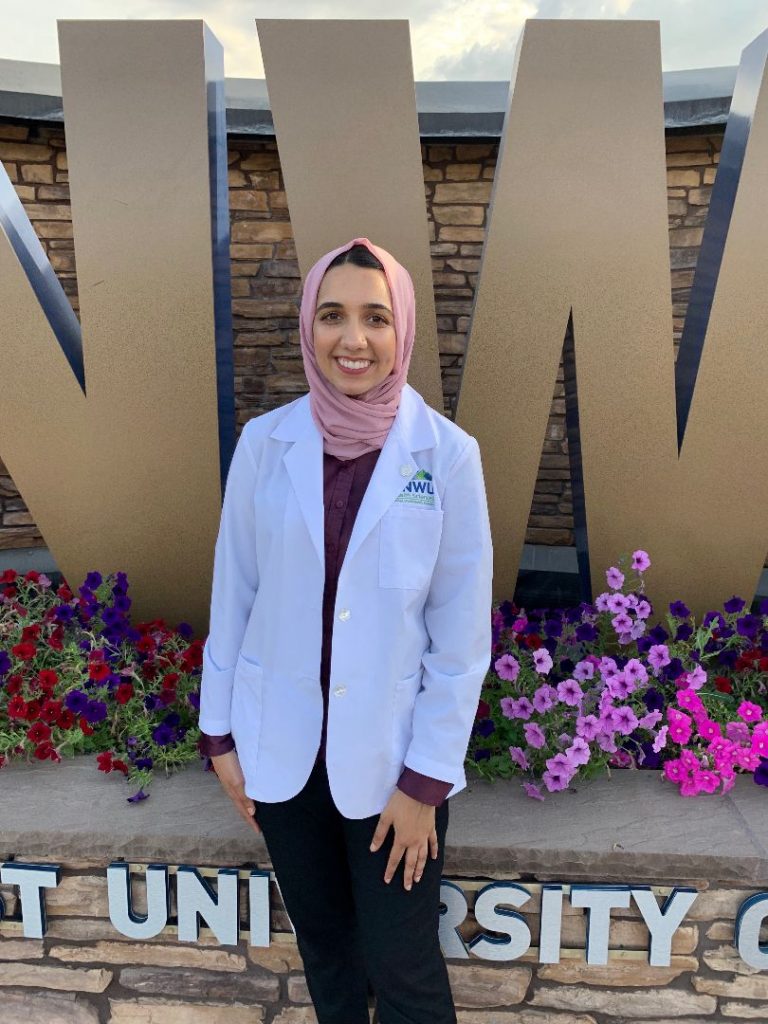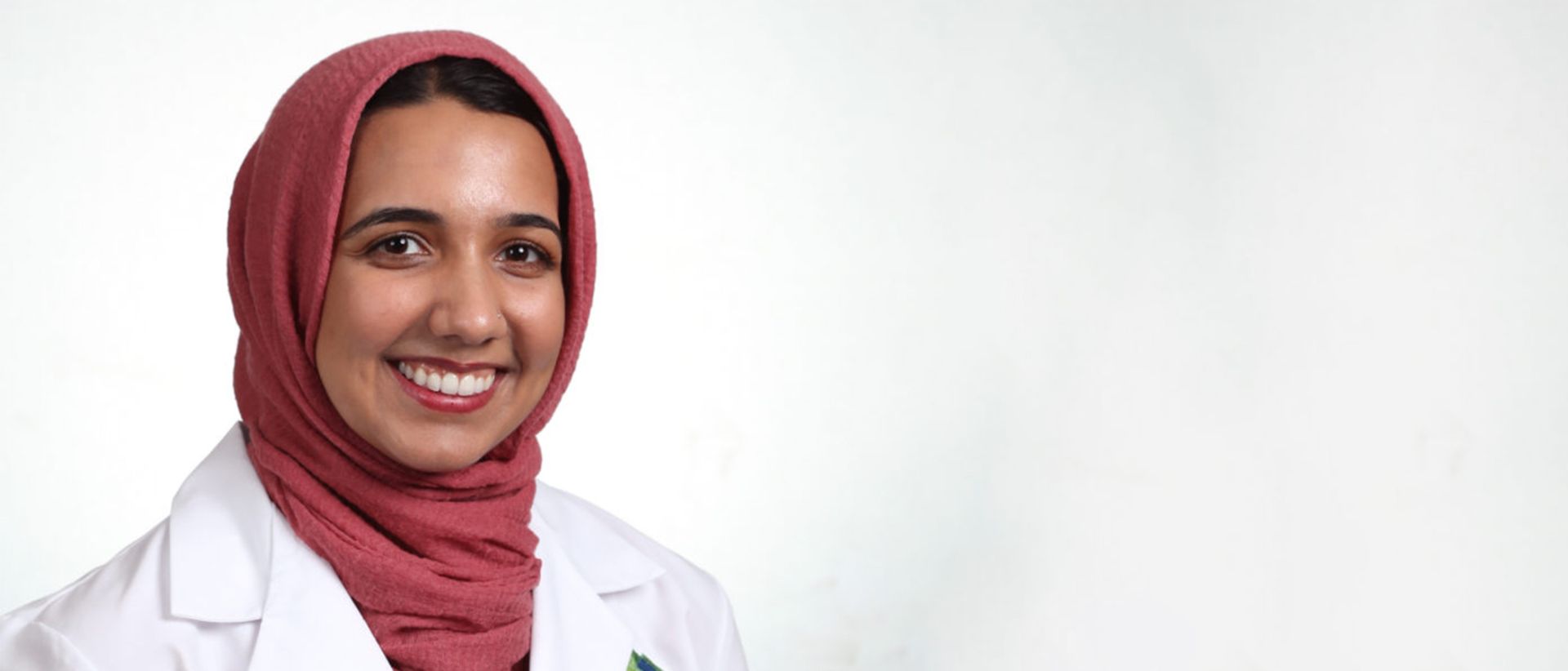For second-year PNWU medical student Dua Khan, life’s inner-workings have long been a subject of inspiration and intrigue. As she looks at the world around her, Khan’s mind naturally drifts into a deep labyrinth of questions resting just below the surface.
Her insatiable curiosity led her to medical school and, ultimately, to a role as the Executive President of PNWU’s Student Government Association (SGA) — the representative voice of her and her fellow medical students. Today, as she and her peers balance the challenges of medical school amidst an unprecedented global pandemic, Khan is striving to represent a group of diverse individuals who find common ground in their commitment to the wellbeing of others. As she leads, she lets her curiosity guide her.
As a child, Dua Khan would spend hours examining the seemingly-minuscule ins and outs of just about everything around her. By studying details, she discovered answers to questions she may otherwise have never considered. Today, thanks largely to that insatiable curiosity, Khan is a second-year osteopathic medical student representing her PNWU peers as the Executive President of PNWU’s Student Government Association (SGA).
Reflecting on the things that have led her to medical school, and to her new presidential role, she can’t help but to dig into the details.

“You have to be different to be yourself,” Khan insists. That belief — in the power of individuality — has long been sewn into the fabric of her character, including as a teen, when she launched her own fashion company, “Designs by Dua.” Classmates loved the handmade headbands and hair accessories she wore and began asking her about them. Sensing an opportunity, Khan decided to start an online store. Soon, her one-of-a-kind items were attracting customers from as far as Australia.
People sought her products for special occasions — weddings and proms — because the products themselves were special; they were unique, and that made them desirable. But Khan had no long-term desires for a career in fashion. While she was undeniably enamored by the small details that had led to the blossoming of her new venture, she’d discovered something even more magnetic during her day job (as a high school student): molecular biology.
It was the study of the very thing that fascinated her. As a biology major at the University of Washington, Khan dove into her courses, devouring information about the mechanisms of the molecules that make us. She studied how cells interacted with one another; how one small change could change everything. She felt that she had found her calling.
One night, following a lecture on the cancer cycle, Khan stood in the shower, her mind still spinning around the things she’d learned. The lecture was focused on p53, a gene that helps keep abnormal cells, including cancer cells, from growing in the body. Mutations in the p53 gene, she learned, could result in cancer cells growing and spreading. The new information offered insight into the inner-workings of life. She felt like a child again, with a world of discoveries awaiting her. Then she felt a lump, and everything changed.
On what would have otherwise been the first day of her junior year of college, Khan sat at home healing from surgery and anxiously awaiting biopsy results from a tumor that was removed from her breast. She tried to stay positive, but fear crept in. “What if everything isn’t okay?” she wondered.
Cancer was no longer just a fascinating topic of focused lectures or books; it was a reality capable of derailing her own dreams. Khan returned to classes a few days later. The tumor was benign, and it was removed, but its effects were inexorable. For the first time in her life, Khan understood that her knowledge couldn’t guarantee her health; that no matter what she knew, she was vulnerable. The words she’d enthusiastically absorbed in her college courses were realities capable of taking lives. She felt helpless and alone, and wondered how other people persevered through such ordeals. It was at that moment that she decided to channel her passions to help.

Still drenched in the emotions that accompanied the discovery of her benign tumor, Khan decided to pursue a career in medicine.
She didn’t want anyone to feel as alone as she had felt. She wanted to be the person that others could turn to; a doctor that understood the inner-workings, both scientifically and spiritually. By connecting with patients on a deeper level, she thought — by tapping into what made them unique— she could help them heal, no matter their prognosis. Committed to making a difference, Khan began volunteering with a hospice group.
The role brought her face-to-face with people who were tasked with accepting their inevitable end. In those moments, she looked into their eyes and asked simple questions: What was your childhood like? What are some of your favorite memories? What makes you “you”?
She learned about the people she met, and in turn, they learned about her, and themselves. Their lives were so much larger than their current circumstances. They were products of every experience they’d ever had, and so was she.
When she returned home from college, she learned of a new opportunity for connection. The mosque she had worshipped in since childhood had opened a free healthcare clinic, and she quickly signed on to help. The mosque, and many of the faces that came to the clinic, were familiar, but nothing else seemed to be. “Before that experience, I didn’t even know the needs of my own neighbors,” explained Khan.
The patients she met came from all walks of life. They spoke a variety of languages, and she helped where she could, translating for those that spoke Urdu. She suspects that her hijab may have made her more welcoming for many of the patients she saw. Some of them were refugees that had fled a brutal conflict in Syria. In many cases, those patients feared sharing too much information about themselves or their children. They worried that too much detail could lead to consequences; to financial punishment, or even deportation.
“How many people aren’t getting the help they need for fear of being vulnerable?” she wondered. “How many people are suffering because they’re afraid to show who they are?”
Today, as a second-year student doctor, Khan is determined to help those very people.
As her SGA’s Executive President, Khan serves as an advocate for the importance of differences. She makes it a point to celebrate the unique details that make her classmates individuals, and capitalizes on every opportunity to amplify the perspectives that have shaped the lives of her and her PNWU classmates.
“You have to be different to be yourself,” insisted Khan. ‘I hope to be a beacon of that. I’m going to tell my peers, and my future patients, to shine; to never shy away from themselves.”
